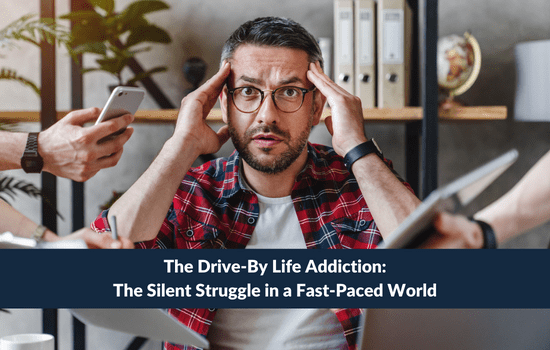Do you have a work-life balance? I've learned that passion affects my ability to practise mindfulness and reduce the 'Drive-By Life' lifestyle.
Navigating Life in the Fast Lane: Unraveling the Drive-By Life Addiction

My passion for work is remarkable. I often have to redirect my thoughts from work in unrelated social settings. While my work stimulates me, I fully recognize the benefits of mindfulness and living a balanced life.
Lately, I find myself constantly driven to do more – to complete just one more task or make one more call, even after a productive day. This relentless drive feels wrong as if I’ve fallen into a "drive-by life."
Understanding What A “Drive-by Life” Is
In my book Giving Back, How To Find Your Personal Joy and Make a Difference to Others, I define "Drive-by Life" as a lifestyle characterized by navigating a constant stream of tasks and obligations. This lifestyle often involves neglecting to acknowledge emotions or savour meaningful interactions and achievements. In the relentless pursuit of productivity, moments blend, leaving a lingering feeling of emptiness upon reflection.
Living a "Drive-by Life" robs us of mindfulness and the ability to fully experience the present moment. It's easy to fall into the habit of merely going through the motions of everyday life, causing days to blur together. Without mindful awareness of our journey, maintaining balance becomes increasingly challenging.
Am I Getting the Most Out of Life?
Living without regrets is essential, especially concerning things I can control. So, I ask myself: am I getting the most out of life? I continue to struggle with this dilemma and ask myself these questions:
-
Do I resist changing my work patterns?
-
Do I love the high I get from working so much daily?
-
Do I have more passion for my work than my family life?
After much thought, I realized that passion is a driving force for me. Passion fuels my success and drives me, but it also makes me question whether too much passion fuels a “drive-by life.”
Does Too Much Passion Negatively Affect Work and Life Balance?
Yes, too much passion can negatively affect work and life balance, particularly in the context of emotional intelligence. While passion drives motivation and commitment, excessive passion can lead to several challenges:
-
Burnout: Overly passionate individuals may become so absorbed in their work or goals that they neglect self-care and boundaries, leading to burnout. Emotional intelligence involves recognizing and managing emotions, including stress and overwhelm, to maintain well-being.
-
Strained Relationships: High levels of passion can sometimes lead to tunnel vision, where individuals prioritize their goals at the expense of personal relationships. Emotional intelligence helps balance passion with empathy and understanding, fostering healthier interpersonal dynamics.
-
Impaired Decision-Making: Excessive passion can cloud judgment and lead to impulsive decisions. Emotional intelligence promotes self-awareness and self-regulation, helping individuals make more balanced and rational choices.
-
Work-Life Balance: Achieving work-life balance requires managing priorities and setting boundaries. Emotional intelligence enables individuals to assess and adjust their commitments, ensuring they allocate time and energy effectively across different aspects of life.
While passion is valuable, emotional intelligence is crucial in harnessing and channelling passion constructively to maintain balance, well-being, and sustainable success in both work and life.
Can I Achieve a Work and Life Balance with Passion?
I believe it is possible to allow passion to drive a balanced life by focusing on these four strategies:
-
Setting Limits: Manage your time realistically by setting aside enough time to complete tasks. Learn to say "no" when requests compete with your priorities. Detach yourself from work at the end of the day.
-
Self-care: Prioritize yourself by eating healthy, exercising daily, and getting adequate sleep. Self-care is a remarkable gift that keeps on giving.
-
Self-awareness: As you become more self-aware, you learn what makes you tick. This awareness positively impacts how you manage yourself and your life.
-
Mindfulness: Practicing mindfulness is a powerful antidote to the unwanted side effects of a drive-by life and is an emotional intelligence competency.
I am confident that I can change my addiction to a drive-by life. Why not use passion as a catalyst to balance work and life by following these strategies, including mindfulness? Review the links in this blog for support to move forward. Marshall Connects offers Emotional Intelligence Assessments and Coaching to enhance skills in all areas, including self-management techniques like self-care.
This article was originally published on September 16, 2017, and has been updated (July 2024).
More Motivational Reads Here »
How Emotionally Intelligent Are You?
Sign up for monthly tips to build your Emotional Intelligence and reduce Emotional Hijacking!

















